Key takeaways:
- Preparation and understanding the conference agenda enhance confidence and facilitate networking opportunities.
- Engaging actively in sessions, asking questions, and connecting with speakers enriches learning experiences.
- Following up after the conference and implementing learned concepts into daily practice solidifies connections and fosters professional growth.
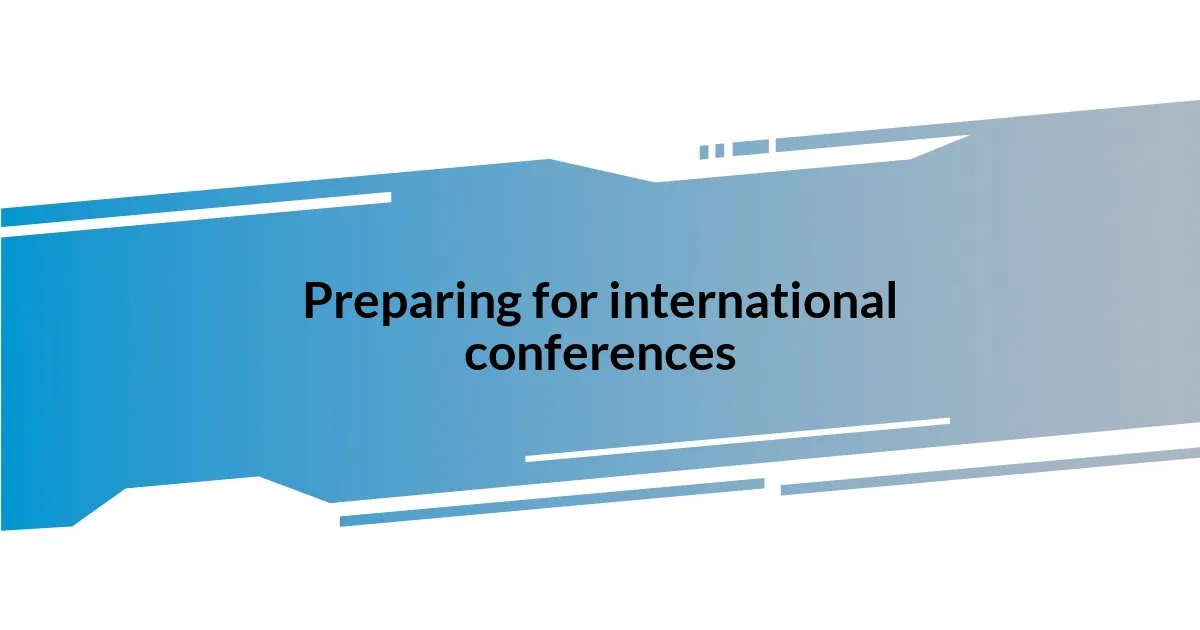
Preparing for international conferences
Preparing for an international conference is like gearing up for an adventure. I remember packing my bags for my first big conference abroad and feeling that mix of excitement and nervousness. I laid out my clothes, but what really mattered was ensuring I had all the essential documents, like my passport and any visa requirements. Isn’t it funny how a little preparation can ease those initial jitters?
Understanding the conference agenda ahead of time can significantly boost your confidence. I usually go through the schedule to pinpoint the sessions I’m most interested in and make a plan for networking opportunities. Have you ever arrived at an event only to feel overwhelmed by the choices? It’s helpful to create a personal roadmap so you can navigate the conference with purpose.
Don’t forget to familiarize yourself with the local culture, too. I once attended a conference in a country where tipping is customary, and I felt embarrassed not knowing the local practice. Engaging with the culture not only enriches your experience but also opens up conversation starters with others. What’s one thing you wish you knew before attending an international event? Trust me; doing a little homework can transform your entire experience.
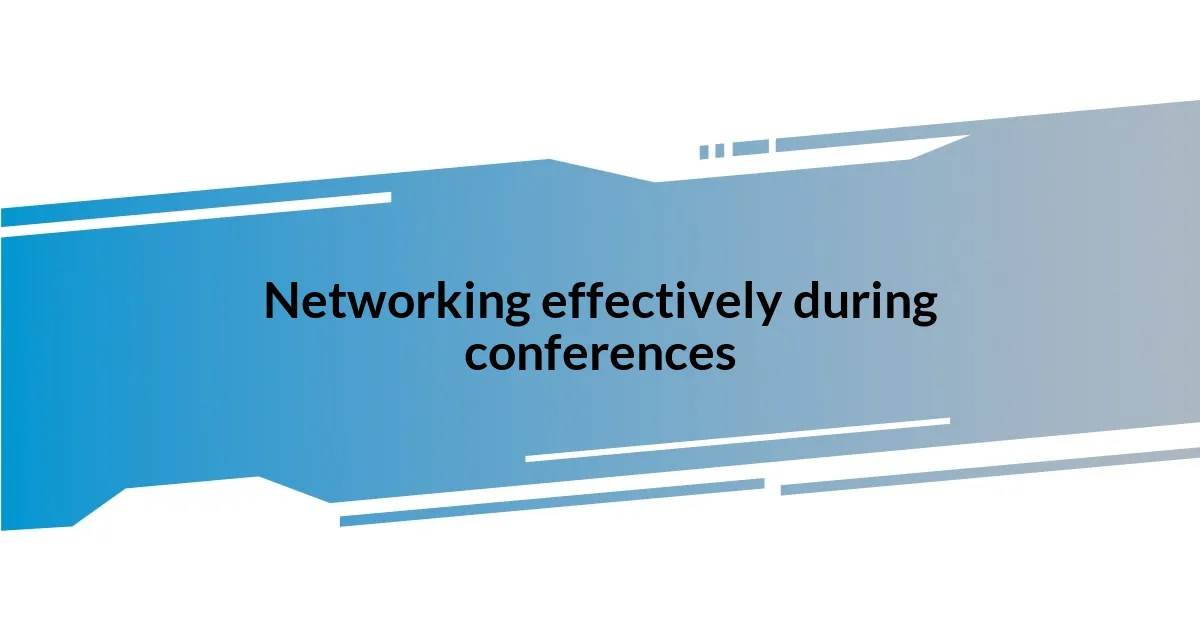
Networking effectively during conferences
Networking effectively during conferences can feel a bit daunting, but I’ve found it can also be incredibly rewarding. At a conference in Paris, I decided to step out of my comfort zone and initiated conversations with strangers during breaks. The result? I connected with professionals from various industries, and one conversation led to a collaborative project that I’m still passionate about. I realized that simply saying “hello” could unlock fantastic opportunities.
One strategy that works well for me is setting specific networking goals for each day of the conference. For example, I aim to meet at least three new people and exchange contact information. This approach creates a sense of accountability and purpose for my interactions. Have you ever tried to remember everyone you met at an event? It can be overwhelming! Keeping my goals straightforward allows me to enjoy the conversations rather than stressing about who I may forget.
Lastly, follow-ups are crucial. I make it a point to send a brief email or LinkedIn message to the people I meet within a week of the conference. I once delayed this step after a fantastic networking opportunity and regretted not keeping that connection warm. A simple note expressing appreciation for the conversation can keep the relationship thriving and foster future collaborations. How about you? What do you find effective in maintaining these newfound connections?
| Method | Description |
|---|---|
| Initiating Conversations | Stepping out of your comfort zone to start chats with strangers can lead to valuable connections. |
| Setting Networking Goals | Aim for specific targets each day to keep your interactions meaningful and organized. |
| Timely Follow-Ups | Sending a quick message after the conference helps maintain connections and fosters potential collaborations. |
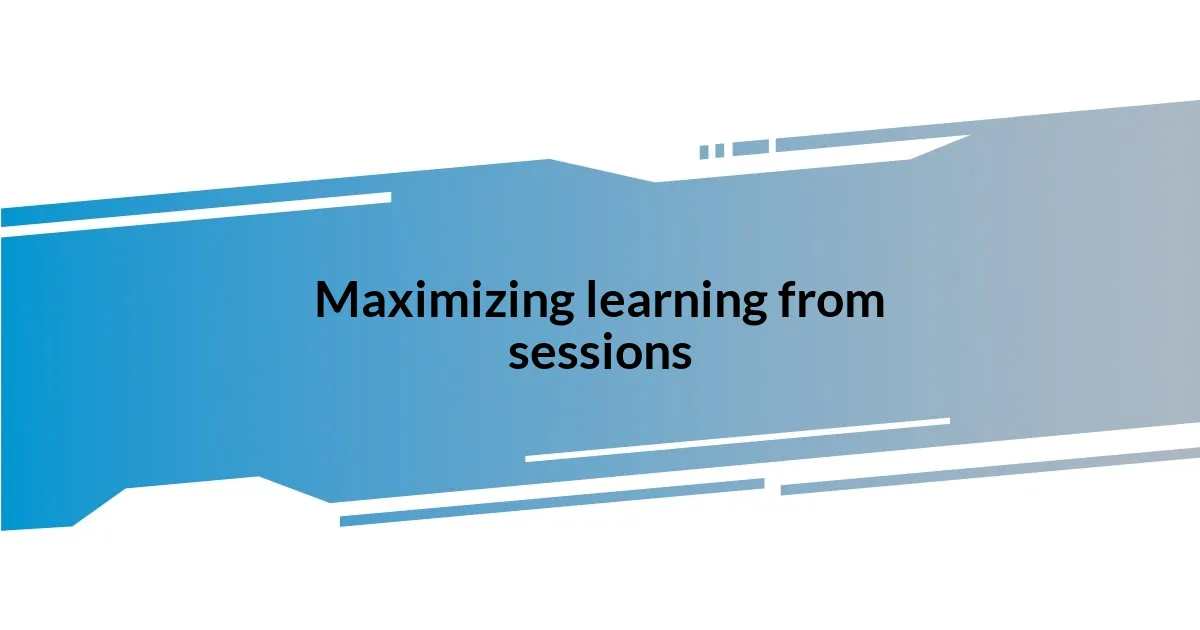
Maximizing learning from sessions
Maximizing learning from conference sessions is all about engagement and application. I vividly remember attending a workshop on effective communication techniques, where I not only took notes but also participated actively in role-playing exercises. This hands-on approach allowed me to absorb the material more deeply. Have you ever felt the difference when you’re passively listening versus actively engaging? It truly transforms your experience.
To enhance my learning, I adopt these strategies:
- Take Meaningful Notes: Instead of transcribing every word, I focus on key takeaways and insights that really resonate with me.
- Ask Questions: If something sparks my curiosity, I make it a point to ask questions during Q&A sessions. It opens up deeper conversations.
- Connect with Speakers: After the session, I approach the speakers to discuss their insights further. It’s a great way to show appreciation and learn more.
- Apply What You Learned: I always try to implement at least one new concept or technique into my work right after the conference. This keeps the learning fresh and solidifies the knowledge in my mind.
During a session on innovative project management, one speaker shared a story about overcoming a project crisis. I felt a wave of inspiration wash over me; I could relate to his struggle. After the session, I approached him to share my similar experience, and we ended up exchanging ideas that were incredibly helpful. Empathy in learning can create connections that last far beyond the conference.
Incorporating these techniques will not only enhance your learning but also make the overall conference experience much more enriching. I see the value in fostering relationships through shared knowledge, and every session is an opportunity for growth.
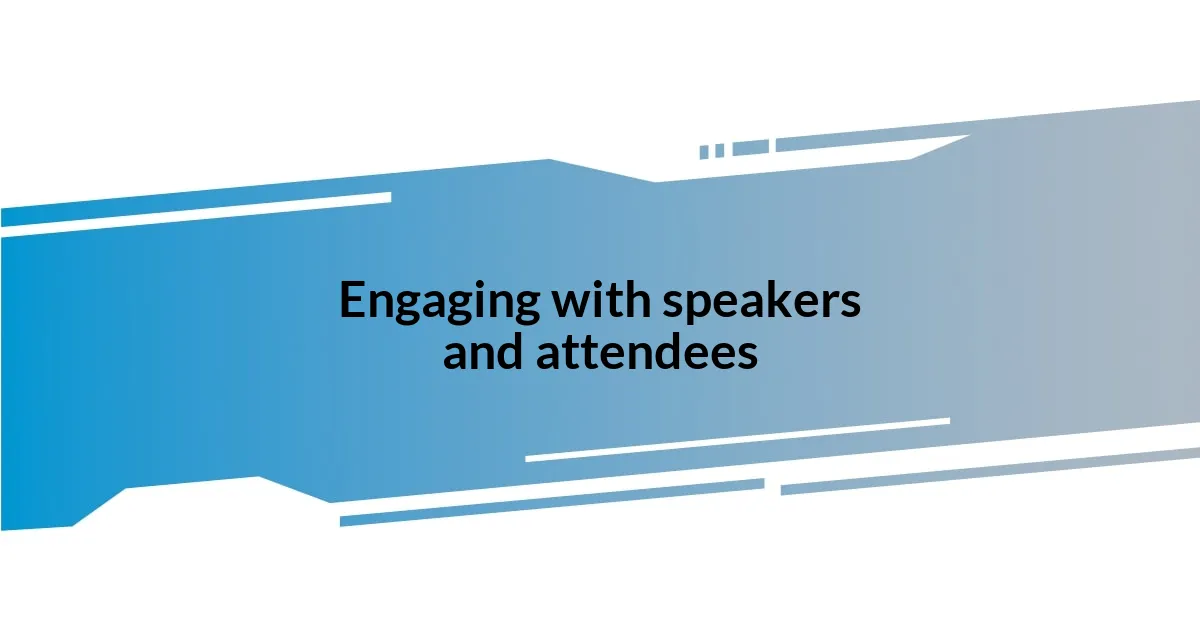
Engaging with speakers and attendees
Engaging with speakers and attendees can open doors to insights and opportunities that you might not find on your own. At one conference, I approached a keynote speaker after their talk, feeling both nervous and excited. I remember asking about their research on digital disruption. My heart raced, but the conversation flowed. We ended up discussing the industry for over twenty minutes! This interaction not only deepened my understanding but also established a connection that later led to a mentorship. Have you considered how just one meaningful conversation can shift your perspective?
I’ve also learned the value of active listening. During panels, I focus intently on the speakers and the audience’s reactions. In one session, I noticed a fellow attendee nodding enthusiastically at a particular point. Afterward, I introduced myself, and we exchanged thoughts on the topic. That simple interaction sparked a discussion that evolved into a partnership on a related project. Engaging with others can open your mind to different viewpoints, so why not make it a point to actively share your own thoughts as well?
Creating a comfortable atmosphere for conversations is another key aspect. I often find that small talk can break the ice before diving into deeper discussions. In a breakout session, I complimented someone on their brave question that challenged the speaker. That small acknowledgment led to a delightful chat about their career journey, which was filled with ups and downs, something I could relate to personally. I’ve realized that establishing this connection often lays the foundation for collaborative opportunities later on. What have you done to cultivate a welcoming environment at these events?
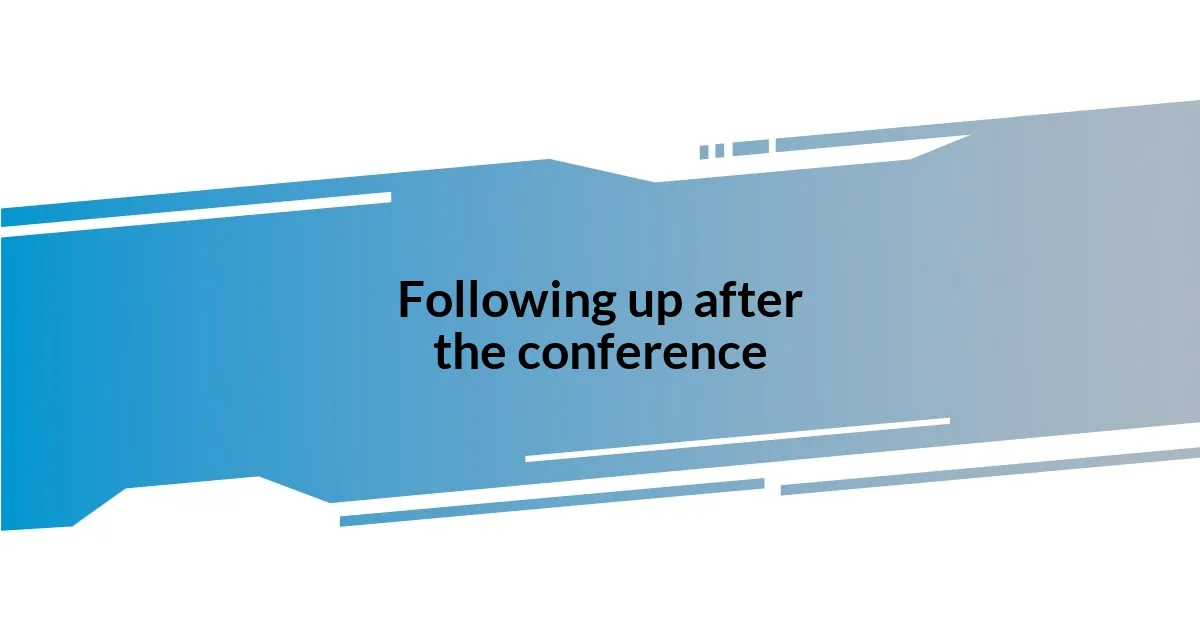
Following up after the conference
Following up after a conference is crucial for deepening the connections you’ve made. I remember a particularly enriching experience where I exchanged contact information with several attendees. When I returned home, I sent a simple email to each person I’d spoken with, mentioning something specific from our conversation. It made the follow-up feel more personal rather than just a generic message. Have you ever noticed how a small detail can make someone feel valued?
In another instance, I took the initiative to connect with a speaker whose session really resonated with me. After sending a brief note expressing my appreciation for their insights, I was pleasantly surprised when they responded with additional resources and offered to keep the conversation going. This not only expanded my knowledge but also opened the door to future collaborations. Have you thought about how impactful these simple gestures can be in building your professional network?
I also find it helpful to integrate the learning from the conference into my daily routine. Within a week or two, I’d revisit my notes and gauge the concepts I could implement. For instance, after a session on agile methodologies, I made it a point to adjust my project workflows accordingly. Reflecting on what you’ve learned can spark new ideas and enhance your effectiveness in the workplace. How do you make sure the insights from conferences don’t fade away but instead become part of your everyday practice?
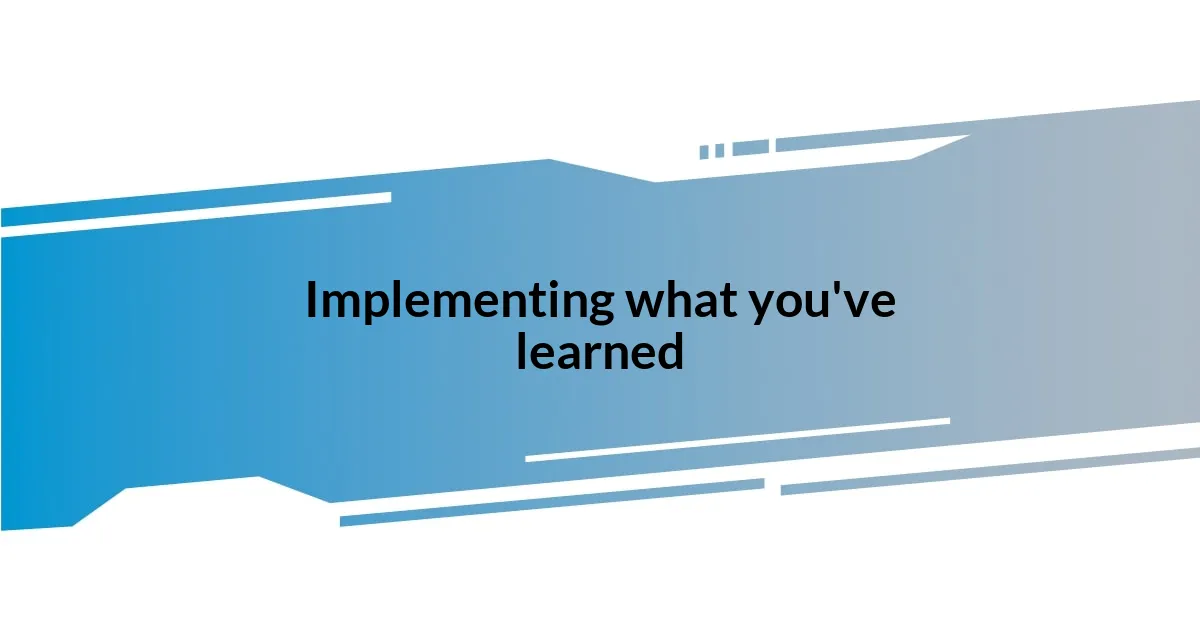
Implementing what you’ve learned
Implementing what you’ve learned can be challenging but also incredibly fulfilling. After attending a workshop on innovative marketing strategies, I felt invigorated. I took the insights I gained and crafted a presentation for my team. Sharing this new knowledge not only inspired others but also deepened my understanding of the material. Have you ever noticed how teaching others can solidify your grasp on a topic?
I’ve learned to embrace trial and error when applying new ideas. For example, I tried implementing a collaborative tool that I learned about at a conference. The first few weeks were a mix of excitement and chaos as we navigated the learning curve. However, with persistence, it became an essential part of our workflow. Isn’t it fascinating how stepping outside of our comfort zones can lead to unexpected successes?
Another method I use is to create actionable plans based on what I absorb at conferences. I prioritize my notes and focus on the top three ideas that resonate most. For instance, after a panel on sustainable practices, I set specific goals for integrating those approaches into my projects. Breaking it down this way has made it much less overwhelming and much more achievable. How do you turn abstract concepts into tangible steps in your professional journey?
